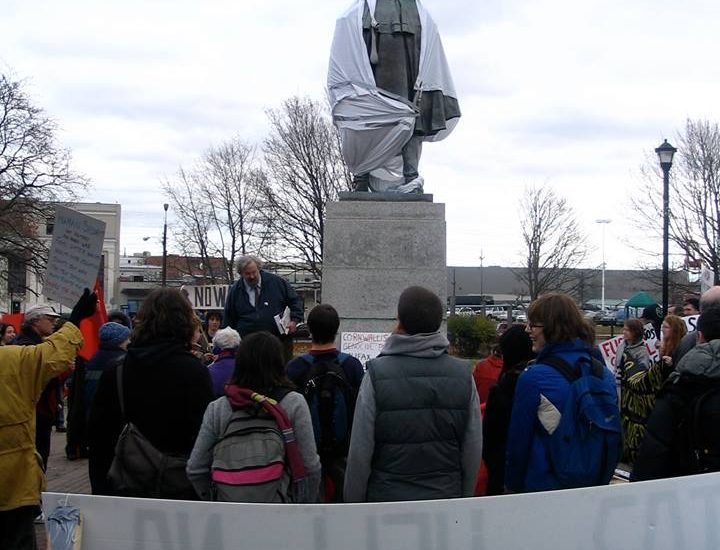

KJIPUKTUK (Halifax) -The Cornwallis report is a good read, and the recommendations it contains on what to do with the Cornwallis statue aren’t bad at all. The statue will remain in storage, Cornwallis Street will be renamed, Cornwallis Park will become an arts-friendly Peace and Friendship Park, there will be an interpretive plan for Point Pleasant Park. There’s more, some of it wishful thinking (affordable housing at the Cogswell Interchange Redevelopment, a city museum), but it’s all good.
When you take into account the stolen land, the genocide, and the misery wrought upon the Mi’kmaq by colonization it’s not enough, of course. We should be talking about reparations, we should be talking about land back. But it’s progress nonetheless.
The report also corrects a flawed historical record, much like the Lord Dalhousie report did for Dalhousie University’s racist ties to slavery.
See also: News brief: Inquiry into Dalhousie’s connection to race and slavery presents preliminary findings
“Insofar as public authorities, in any of the provinces contained wholly or partly within Mi’kma’ki, or later the federal government, were involved in the restriction of reserve territory at a known cost in terms of health and mortality, in permitting even further encroachments, and then in cultural and psychological attempts at erasure, their efforts were – to use a word that must always be used sparingly and with caution – genocidal,” the report states unequivocally.
But ironically, when it comes to how we reached this milestone moment, the report erases a long history of resistance to the statue and all that it stands for, much of it led by Mi’kmaw women. The report mentions a letter to the editor by Mi’kmaq historian Dan Paul, author of We Are Not the Savages, but that’s it.
The way the report tells it, it was a plea by Mi’kmaq poet Rebecca Thomas that changed the hearts of fence-sitting councillors who then voted to commission the report.
Not to take away from Thomas’ powerful words, but it’s only part of the story.
Leading up to this there were large rallies, email campaigns and petitions, a campaign mostly led by Mi’kmaw women such as Suzanne Patles, Thunderbird Swooping Down Woman, Michelle Paul, Rebecca Cope and others. When Council voted the statue was already gone, removed because of public safety concerns in view of a rally that was expected to draw huge crowds.
And even that campaign built on the work of activists before them.

As Tony Seed describes, as early as 2010 Halifax activist Betty Peterson, in a speech at the park, called on everyone “to endorse the mass petition initiated by the Mi’kmaq and their allies to deCornwallize (decolonize) Nova Scotia [Cheers], to remove the name of this genocidal officer from the names of all public buildings, sites and towns in Nova Scotia. [Cheers] Denounce the stubborn, unjustifiable resistance of the governments to this just and principled demand!“
Activists protesting the inaugural Halifax International Security Forum (HISF) renamed the Cornwallis Park the Peace and Freedom Park and covered the statue one year prior, in November 2009.
“I think we learned in the sixties and the seventies that mass movements can indeed bring about systematic change. If one looks at all the legislation that was passed, the Civil Rights Act, for example, the Voting Rights Act, that did not happen as a result of a president taking extraordinary steps. It happened as a result of people marching and organizing,” wrote Angela Davis.
Similarly, we did not rid Halifax of the Cornwallis statue because councillors finally recognized that it was the right thing to do. It happened as a result of people marching, organizing, and speaking out, with mostly Mi’kmaq women leading the effort. That’s a realization we shouldn’t lose sight of.
See also: History of Halifax, a Mi’kmaw perspective
With a special thanks to our generous donors who make publication of the Nova Scotia Advocate possible.
Subscribe to the Nova Scotia Advocate weekly digest and never miss an article again. It’s free!



